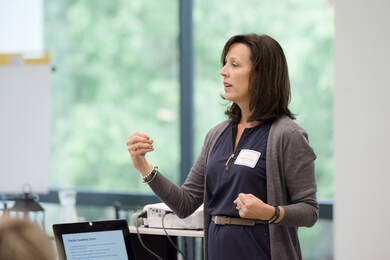Teaching the Teachers
Established in fall 2018, the UCI Teacher Academy provides professional development opportunities to all educators. After hosting more than 2,500 professionals in its first year, it plans to grow into a learning ecosystem for teachers and administrators across Southern California.
|
The UCI School of Education’s Teacher Academy launched with a simple, yet nuanced philosophy - teaching is a complex profession that requires continuing education and development of teachers and instructional leaders. Without ongoing professional learning, teachers have a difficult time improving instruction, and their students can suffer as a result.
“We need to give teachers the time and space to learn in order to continue to grow and get better at their profession,” said Elizabeth van Es, co-director of the UCI Teacher Academy and associate dean at the UCI School of Education. “Unlike other professions, teachers are expected to be an expert on the first day of school – they need deep understanding of the content they will teach and how to make it accessible to learners, how to create positive learning environments for students, how to be responsive to their students, and how to work with parents and administrators. This all comes in addition to planning and leading high-quality lessons day in and day out, that align with standards initiatives in their districts and states. |
“There is no other profession that demands so much of a beginner right out of the gate.”
What is the Teacher Academy?
The Teacher Academy - established with a founding gift from SchoolsFirst Federal Credit Union – provides a home for teachers and school leaders to develop and enhance their professional practice. Through a multi-faceted approach, the Teacher Academy supports all teachers throughout the educator lifecycle – from aspiring teachers to senior administrators.
The Teacher Academy addresses teacher and school leaders’ learning needs in a variety of ways. First, it offers professional development workshops via five California Subject Matter Projects (CSMPs). These workshops provide teachers with ways to teach content in an engaging way. “It’s one thing to know about photosynthesis,” van Es explains, “but a whole other matter to know how to teach it to a fifth-grade science class.”
“Research is conclusive that teachers benefit most from sustained, long-term professional development,” said Nicole Gilbertson, co-director of the Teacher Academy and director of the UCI History Project. “To be their best, teachers need opportunities for learning, collaboration, and reflection.”
Schools can at times struggle at developing an infrastructure of local leaders who can support ongoing collaboration and reflection. As it develops, the Teacher Academy will host workshops to prepare K12 school leaders to lead school improvement efforts in the context of of local Professional Learning Communities, where teachers use data to guide their decision-making and collectively consider how to address the specific needs of students at their school sites.
The Teacher Academy also supports teacher preparation – in particular, the School of Education’s Masters of Arts in Teaching program and UCI CalTeach. By working closely with these units, the Teacher Academy prepares mentor classroom teachers to support the next generation of teachers to enact innovative and transformative learning experiences.
The Teacher Academy - established with a founding gift from SchoolsFirst Federal Credit Union – provides a home for teachers and school leaders to develop and enhance their professional practice. Through a multi-faceted approach, the Teacher Academy supports all teachers throughout the educator lifecycle – from aspiring teachers to senior administrators.
The Teacher Academy addresses teacher and school leaders’ learning needs in a variety of ways. First, it offers professional development workshops via five California Subject Matter Projects (CSMPs). These workshops provide teachers with ways to teach content in an engaging way. “It’s one thing to know about photosynthesis,” van Es explains, “but a whole other matter to know how to teach it to a fifth-grade science class.”
“Research is conclusive that teachers benefit most from sustained, long-term professional development,” said Nicole Gilbertson, co-director of the Teacher Academy and director of the UCI History Project. “To be their best, teachers need opportunities for learning, collaboration, and reflection.”
Schools can at times struggle at developing an infrastructure of local leaders who can support ongoing collaboration and reflection. As it develops, the Teacher Academy will host workshops to prepare K12 school leaders to lead school improvement efforts in the context of of local Professional Learning Communities, where teachers use data to guide their decision-making and collectively consider how to address the specific needs of students at their school sites.
The Teacher Academy also supports teacher preparation – in particular, the School of Education’s Masters of Arts in Teaching program and UCI CalTeach. By working closely with these units, the Teacher Academy prepares mentor classroom teachers to support the next generation of teachers to enact innovative and transformative learning experiences.
|
Why is the Teacher Academy Effective?
By bringing all the CSMPs under one umbrella, the Teacher Academy is able to better harness the support of the School of Education and its leading faculty, improve coordination between UCI and K12 schools, and create additional synergies between all of the school’s initiatives, such as the OCEAN Network. In the first full calendar year of operation, the Teacher Academy hosted more than 2,500 educators across dozens of workshops and conferences. Representatives from school districts across Southern California – Los Angeles, Capistrano, Orange and Saddleback Valley, to name a few – have participated. Upcoming workshops can be seen here. “I had the opportunity to learn from leading scholars, create inquiry-based lessons and units, and collaborate with passionate educators from various schools across Southern California,” said Jane Suh, teacher at Jordan High School in Long Beach and teacher leader for the UCI History Project. “Participating as a teacher leader has challenged me be more of a mindful educator who strives to meet the various learning needs of my students.” |
“I just love how Teacher Academy workshops bring in tangible lessons that we can bring straight to the classroom,” said Jessica Nibarger, teacher at Rancho Charter School in Anaheim. “These lessons encourage our students to collaborate and demand that they do critical thinking.”
"Attending the workshop on Youth Participatory Action Research as a team was inspirational! Engaging in simulated activities and seeing artifacts from classrooms brought the practice to light," said Lynn Schaulis, Norwalk La Mirada Unified School District Literacy/Social Studies Teacher on Special Assignment. "We are grateful for the chance to learn from esteemed educators and authors through the generosity of the Teacher Academy and SchoolsFirst funding."
In fall 2019, the Teacher Academy added the UCI Science Project. Leadership is currently working with community partners to establish a network of teachers and UCI faculty to create professional development focused on Next Generation Science Standards.
"Attending the workshop on Youth Participatory Action Research as a team was inspirational! Engaging in simulated activities and seeing artifacts from classrooms brought the practice to light," said Lynn Schaulis, Norwalk La Mirada Unified School District Literacy/Social Studies Teacher on Special Assignment. "We are grateful for the chance to learn from esteemed educators and authors through the generosity of the Teacher Academy and SchoolsFirst funding."
In fall 2019, the Teacher Academy added the UCI Science Project. Leadership is currently working with community partners to establish a network of teachers and UCI faculty to create professional development focused on Next Generation Science Standards.
|
Building the Academy to Support All Educators
Van Es and Gilbertson want to build the Teacher Academy into a more robust ecosystem. They see the Teacher Academy as an environment with multiple entry points – one where an educator can engage in anything from a single workshop to an eight-week program, in person and online. Central to this vision is building a cadre of practitioners from partner schools and districts who will also create learning experiences and content. “We recognize that the university has knowledge and resources to share,” van Es said. “Equally important are the voices of practitioners who already lead professional learning. We want to create a space where they can share their expertise so teachers can learn with and from their colleagues.” “Additional funding can allow the Teacher Academy to continue to develop programs specifically targeted at the needs of teachers and districts,” Gilbertson said. “This support will also allow us to increase the number and scope of workshops, provide opportunities for teams of teachers to come to UCI, develop a newsletter full of curated lessons, and bolster the online offerings available for teachers who prefer to learn remotely.” An online education platform and digital newsletter - featuring lectures, classes, essays and practical skills training - would be particularly beneficial to teachers from schools with limited resources and access to quality professional learning experiences. The Teacher Academy and its CSMPs offer registration reimbursements to teachers from districts who serve students from underserved communities, and are looking to increase their support levels. Virtual learning environments can target an increased number of districts looking to enhance their professional development. |
FEATURED EVENT
National Teacher Appreciation Day 
On May 7, 2020, the UCI Teacher Academy will welcome Jeff Duncan-Andrade (right) to its third annual National Teacher Appreciation Day celebration. Duncan-Andrade is an associate professor of Raza Studies and Race and Resistance Studies at San Francisco State University and a founder of the Roses in Concrete Community School, a community responsive lab school in East Oakland, and the Community Responsive Education Group. As a classroom teacher and school leader in East Oakland for the past 27 years, his pedagogy has been widely studied and acclaimed for producing uncommon levels of social and academic success for students. Duncan-Andrade lectures around the world and has authored numerous journal articles and book chapters on effective practices in schools.
This year, for the first time, the Teacher Academy and UCI School of Education will recognize the nominees for the Orange County Teachers of the Year award, given annually by the Orange County Department of Education. The event is an opportunity to recognize all educators for their efforts in shaping future generations, and for teachers to develop practical skills from a keynote speaker. |
The Teacher Academy is also looking to develop programming specifically for administrator leadership and development.
“It is well documented that school administrators play a central role in supporting instructional improvement in their schools,” van Es said, “but what it looks like to lead these efforts is often invisible to administrators.”
The Teacher Academy plans to leverage technology by offering web-based resources to make visible the ways that school administrators can support and sustain professional learning initiatives that transform practice. Van Es also envisions an annual or biannual conference that creates an immersive experience to share successes of school reform.
“We should be recognizing that there are teachers and school leaders out there who can teach best practices in a variety of areas,” van Es said. “If learning requires constant engagement with others in practice – which is how every other profession is – then how do we create a setting to make that happen?”
With every additional component added to the Teacher Academy, the focus remains the same: improving teaching performance, which trickles down to improved student outcomes.
“Students deserve teachers who have a deep expertise in the knowledge of their content-area and the best ways to include all students in the curriculum,” Gilbertson said.
“It is well documented that school administrators play a central role in supporting instructional improvement in their schools,” van Es said, “but what it looks like to lead these efforts is often invisible to administrators.”
The Teacher Academy plans to leverage technology by offering web-based resources to make visible the ways that school administrators can support and sustain professional learning initiatives that transform practice. Van Es also envisions an annual or biannual conference that creates an immersive experience to share successes of school reform.
“We should be recognizing that there are teachers and school leaders out there who can teach best practices in a variety of areas,” van Es said. “If learning requires constant engagement with others in practice – which is how every other profession is – then how do we create a setting to make that happen?”
With every additional component added to the Teacher Academy, the focus remains the same: improving teaching performance, which trickles down to improved student outcomes.
“Students deserve teachers who have a deep expertise in the knowledge of their content-area and the best ways to include all students in the curriculum,” Gilbertson said.



